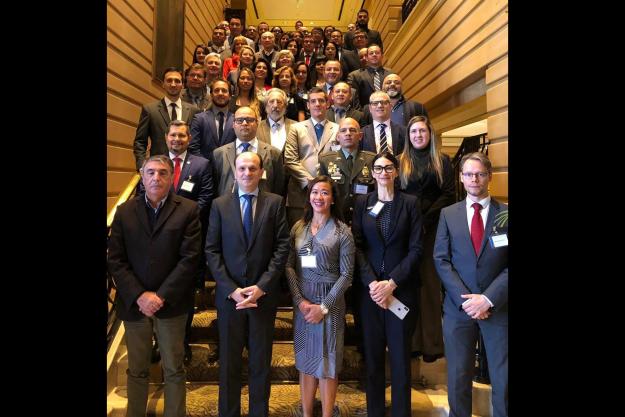
Participants at a sub-regional stakeholders forum in Buenos Aires
THE HAGUE, Netherlands – 26 September 2019 – National Authorities and stakeholders from States Parties in Latin America exchanged best practices, challenges, and priorities related to the implementation of Chemical Weapons Convention (CWC) at a sub-regional stakeholders forum in Buenos Aires, Argentina on 17 to 19 September 2019.
In his opening remarks, Ambassador Pablo Beltramino, Undersecretary for Foreign Policy of the Ministry of Foreign Affairs and Worship of Argentina, expressed his country’s commitment to the non-proliferation of chemical weapons, and highlighted the importance of regional cooperation in order to effectively respond to threats of use of chemical weapons.
Ms Sharon Rivera, Program Officer-Legal, reiterated the importance of effective cooperation between national stakeholders.
During the forum, participants discussed challenges in national implementation of the CWC , including coordination with relevant stakeholders, means for improving the methodology for site selection for inspections, legal and regulatory frameworks on chemical security, and enhancing emergency preparedness and response. Participants also shared best practices and identified ways to enhance bilateral and regional cooperation in addressing common challenges. At the end of the Forum, the participants identified next steps they would implement at a national level.
Experts from the OPCW and from international organisations outlined capacity-building programs available to States Parties that may require assistance on various implementation issues.
The Forum was attended by representatives from: Argentina, Brazil, Chile, Colombia, Cuba, Mexico, and Peru. Experts from the UN Security Council 1540 Committee, the Organization of American States and the International Council of Chemical Associations also participated in the event.
Background
As the implementing body for the Chemical Weapons Convention, the OPCW, with its 193 Member States, oversees the global endeavour to permanently eliminate chemical weapons. Since the Convention’s entry into force in 1997, it is the most successful disarmament treaty eliminating an entire class of weapons of mass destruction.
Over 97% of all chemical weapon stockpiles declared by possessor States have been destroyed under OPCW verification. For its extensive efforts in eliminating chemical weapons, the OPCW received the 2013 Nobel Peace Prize.
